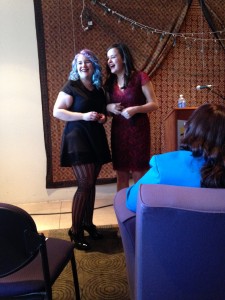Tags
Related Posts
Share This
Room for Thought In Santa Fe
“‘Remember, there’s no room for kindness in art.’”
I spoke my words at the podium, looking out at the stretch of chairs and familiar faces. Four years earlier, an acting teacher had said those very words to me. In complete sincerity and utter arrogance, he had stood above a class of hopefuls, flipping back his hair and tucking his hands in tight pockets.
In 2010, I had just left London, from what could only be described as “my dream scenario”: acting, sword-fighting and bumping to the beat of iambic pentameter. When I ran out of my money, I was forced to come home and take acting classes in New York instead. For anyone else, this could be a dream situation. However, my ego confined my “dreams” to an old ideal: my idea of myself, of my life, could never grow or expand, because I wanted what I had pictured for years, what I had grasped even for just a moment.
This acting teacher had spoken with such conviction, and moved about his life with such sadness (translated into self-importance). This man had been trapped in a business, in a city, for so long that he had lost what made him human. He was a caricature: a man who thought in extremes. Is this what acting does? I thought. I became terrified, doubtful, frozen. After a year of that, I did all I thought I could: I changed career paths, colleges, and states.
I stood in front of a map, closed my eyes, and quite literally pointed anywhere. I found my shaking finger above Santa Fe, New Mexico, and decided it was fate. At the time, I didn’t realize I was working in extremes all on my own. For all my rejection of the life I feared, my actions were just as unvarying as that of my teacher.
I found Santa Fe University of Art and Design. I spent my first year depressed and regretful, not understanding the vast expanse of dirt, not understanding the lack of delivery food and quality of pizza. I had no car, no friends and no emotional outlet. After acting heavily, writing words on a page just wasn’t helping.
At the risk of sounding melodramatic, I cried, then cried some more, called my mom, smoked some cigarettes, sat in the shower fully-dressed in the shame of smoking those cigarettes, and became best friends with the Domino’s delivery man. I dreamed about London, and envisioned an unchanging image of myself with a script in one hand, a classy wine glass in the other, and a British man stroking my hair while I practiced for Shakespeare in the Park.
I ignored the general curiosity and warmth of my classmates. I had plenty of affection in my sights, but felt like a clown in my classes; when I made jokes, I imagined a monkey playing the accordion behind me. I was the “wacky New York chick.” My Creative Writing chair at the time, Dana Levin, tried her very best to open my eyes. She acknowledged my voice, she let me rant about how I missed fresh bagels, she let me schedule my time here the way I needed.
I finally fell into what seemed a natural Santa Fe progression: I walked across the street to Yoga Santa Fe. At six in the morning, the sun gushed through the corners of the windows, everything smelled like passion fruit, and the feet of my classmates touched the ground with more balance than any seasoned New Yorker on a subway train. They were set in gravity, in their bodies. I sat with them, my head and inner critic whirling, trying to show me the English man and perfect life I was missing.
“Truth is my identity,” the yoga teacher said, translating the Sanskrit word “Satnam.” The words were simple, yet they seeped into my pores. The mantras set my mouth moving and silenced my “ideals.” After 20 minutes of incantation, I imagined bits and pieces of gunk hanging around my heart, around my eyes, around my toes. I scrubbed at them, and with every repeated word I saw less mud and more light.
I left that class and saw the sky. Twisted clouds were clear above the arroyos. I felt the power of words, and my hands flew across a keyboard. My pen scribbled excitement on the poems of my colleagues. I was excited to revise and to read. I was excited to use my mind and to see possibilities. It was as if I had just woken from a coma. There was tenderness in my classes, importance in my voice and importance in theirs.
“‘There’s no room for kindness in art,'” I read at my senior reading, quoting the man who had so frightened me years before. I felt the purpose in the words, despite their absurdity.
I now looked across a room of support and winked at my fellow reading women. Our loyalty for one another’s words radiated off our bones. It completely discounted my acting teacher’s fears. There was a great deal of room for kindness in art. I just had to find the space for it, in a vast desert and an open mind.
Sara Malinowski graduates this semester from the Creative Writing Department. Her senior book, What Are They Then, is available for purchase on Lulu.







 Jackalope Magazine is the student magazine of Santa Fe University of Art and Design. Building on the interdisciplinary nature of our education, we aim to showcase the talent of our university and character of our city.
Jackalope Magazine is the student magazine of Santa Fe University of Art and Design. Building on the interdisciplinary nature of our education, we aim to showcase the talent of our university and character of our city.
Recent Comments